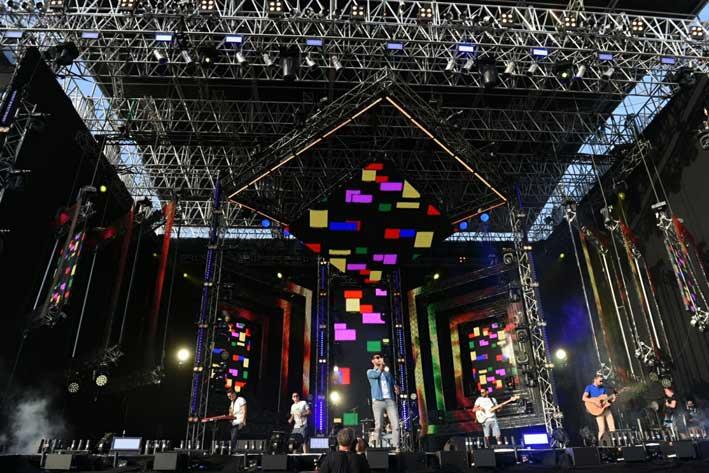Summer is a time for ice-cream and sea, but also a time for parties and open-air activities. With these leisure activities come a slew of complaints, evident from the many Facebook posts about noise pollution. Some commentators believe that it is up to the individual posting the complaint to deal with the problem but many others believe that noise pollution is a big problem in Malta.
The Malta Independent on Sunday spoke to John Fenech, Chairman of the Noise Abatement Society of Malta (NASoM), to discuss the laws concerning noise pollution from amplified music.
Noise pollution from amplified music constitutes sources such as restaurants, bars, hotels, nightclubs and discotheques. In the Maltese Islands, there are at least 2295 bars as well as 590 restaurants and several clubs and discos.
Other sources of loud music - including band clubs, local councils, theatres, wedding halls, open-air activities, fiestas and farmhouses - are not regulated with respect to the playing of amplified music.
Open-air activities include those that take place at the Granaries and at the Valletta open-air theatre. Although these activities may have permits, they do not include noise level restrictions. Furthermore, the Society's chairman says it is pertinent to ask "which piece of legislation permits the constant disruption of the resident's right to the quiet enjoyment of their property?"

Incidentally, the duties of the police at these activities do not include noise prevention, especially noise emanating from loud music. Nevertheless, the Police Act states that the main objectives of the Force are "to prevent the commission of offences... even before action is needed through the judicial system to repress, sanction or remedy any breach."
It is important to note the distinction between noise pollution and noise as a nuisance. The former is a serious threat to the health and wellbeing of the individual. Unfortunately, in Malta noise is considered as an irritation or a nuisance, which is of no consequence to a person's health.
The legislation
There are four pieces of legislation intended to control nuisance from loud music. The regulations are shared between three regulatory entities that form part of three different ministries. However, there is no specific institutional mechanism for the coordination of matters related to noise.
The Malta Tourism Authority (MTA) is the entity responsible for the enforcement of the Catering Establishments Regulations. The MTA also issue the necessary permits for the relevant activity. The application for applying for a permit states that, among other requirements, the establishment needs to be soundproof.
Within the Trading Licence Act, the business hours for the operation of establishments which play amplified music are noted. This legislation notes that "the playing of music by whatever means inside commercial premises when they are not licensed to play amplified music shall stop by 11.00 pm and between 1.00 pm and 4.00 pm."
Since the Catering Establishment Regulations require a permit, it is seen as a contradiction that the Trading Licence Act mentions premises that are not licensed but still allowed to play amplified music.
Another part of this legislation states that if the place is licensed to play music and if the music can be heard from outdoors it is prohibited after 11.00pm and between 1.00pm and 4.00 pm.
Bugibba, Qawra and St Paul's Bay are an exception to the rule, as music can be played until midnight and, in designated areas in the same areas, even until 1.00 am.
However, the Trading Licences Regulation, states that commercial activity shall not "cause annoyance to neighbours" and shall not "cause annoyance by way of noise."

The regulators
The Trading Licence Unit (TLU) is the regulator of both the Trading Licence Act and Business Hours Regulations but, nevertheless, it does not enforce the noise regulations. In fact, the TLU explains in great detail how and by whom the noise regulations should be enforced.
A Police Sergeant has the power to order the immediate remedy of any such breach to his satisfaction. Fenech explains that, following a complaint, the sergeant should visit the site from which the noise is emanating and do his best to stop the source of the noise.
If the noise does not stop, a Police Inspector (or higher ranking) can order the immediate closure of the premises for a period of 12 hours. The Commissioner of Police can also issue an order in writing for the immediate closure of the premises and the cessation of any commercial activity from said premises.
There are also references in the Code of Police Law and the Criminal Code which stipulate that "The court shall, upon an application to that effect by the Police, authorise to remove any nuisance or inconvenience to which the offence relates at the expense of the offender."
Although legislation for this particular noise pollution exists, there are some issues with its enforcement: for one, the Authorities operate during office hours whilst catering establishments mostly operate after office hours. Although the police operate around the clock, it appears that noise nuisance is - by nature and exigency - low on the law and order agenda.

Case studies in Valletta
The NASoM carried out two case studies in Valletta to measure the noise levels from catering establishments and noise levels from the open-air theatre.
It was found that, in both cases, the values measured during an activity at the theatre and when the establishments are open were significantly higher than those defined by the WHO Guidelines for Community Noise for evening or night-time. The report determined that the nearest sensitive receptors were justified to complain about noise emissions.